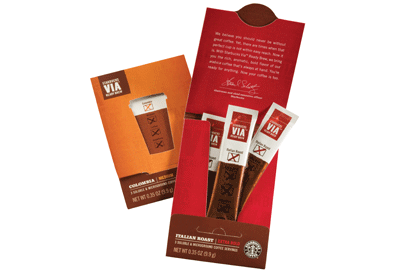When news of Starbucks' plans to launch an instant coffee emerged last year, the development was greeted with bemusement and, in some cases, horror.
Commentators questioned the impact the launch could have on the brand of the world's biggest coffee-shop chain, which prides itself on fresh coffee. Doomsayers predicted that associating Starbucks with an instant product, which is viewed as inferior to fresh coffee, could have a detrimental effect.
While the long-term effects of the initiative are unknown, in the short term, it is hard to view the roll-out of Starbucks Via Ready Brew as anything other than a success. Since its launch in March, Via has racked up $100m in global sales.
Starbucks' UK store sales from July to September were 6% up on last year. The rise was partially attributed to Via, which sold more than 9m servings in the first six months. While the product was initially sold only in Starbucks outlets, it is now available in major supermarkets, as well as from selected airlines and rail companies.
Entering the fray
However, early next year, Starbucks will be forced into battle against coffee giant Kraft Foods which, as Marketing exclusively revealed last week, is drawing up plans to muscle in on the premium instant-coffee market.
It is understood that the product, Kenco Millicano Wholebean Instant, will be sold in a silver tube to imply premium associations, when it reaches supermarket shelves from March.
The launch may even be the reason for Starbucks' announcement earlier this year that it was ending a 12-year global distribution deal with Kraft.
A Kraft spokeswoman says that with Millicano the company is aiming to 'attract a wide range of instant-coffee drinkers who are looking for a better-quality coffee'.
'As a premium-coffee brand, Kenco Coffee has always been focused on providing high-quality products to UK coffee lovers and innovating to address different market opportunities,' she adds. She would not be drawn, though, on whether the concept was inspired by Via.
Richard Tolley, interim marketing director of hot-beverage specialist Bettys & Taylors of Harrogate, says Starbucks' move has set the bar for others to reach.
'It's no longer companies such as Kraft and Nestle (the owner of Nescafe) that are setting the NPD agenda. It's the likes of Starbucks, as people are defining coffee through their out-of-home experiences,' he adds. 'There hasn't been any significant innovation in instant since freeze-dried 30 years ago.'
A desire for better-tasting instant coffee has long been the goal for manufacturers. Those old enough will remember the Red Mountain ad campaign from the 80s, which used the strapline 'Ground coffee taste without the grind.' The ad featured hosts making the sound of coffee percolators to fool their guests into thinking they were being served ground coffee.
Whether the brand's claim lived up to reality is a moot point, but Brian Waring, vice-president, marketing and category, Starbucks UK & Ireland, is adamant that Via, which took 20 years to develop, represents a step-change in taste.
'It's a totally different process that makes Via more similar to a filter coffee in terms of flavour and aroma,' he says.
New technology
Waring claims the patented process used by Starbucks to make Via, which is derived from Arabica coffee in an instant and microground form, is very different from the way in which instant coffee is usually produced. Kraft is believed to be using a similar technique to create Kenco Millicano.
While Kraft looks set to use a heavyweight ad campaign to promote its product, Starbucks has put experiential at the heart of its promotional programme for Via.
'It was a conscious decision to launch it in our stores first, five to six months ahead of going into grocery,' says Waring.
'We were able to connect with the 2m customers who come to our stores every week.'
The company ran a 'taste challenge' to demonstrate Via's quality, asking consumers whether they could tell the difference between Via and fresh coffee.
Turning to Kraft's plans, Waring claims 'all launches are positive' as they serve to educate UK consumers, who still drink more tea than they do coffee.
Nonetheless, the signs are that the emergence of a premium instant-coffee market will shape up to be a key battleground for the major players in the hot-beverage sector for 2011 and beyond - especially if they crack the taste challenge.


